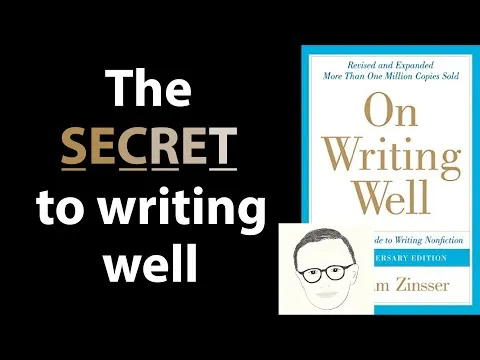"The classic guide to writing non-fiction"
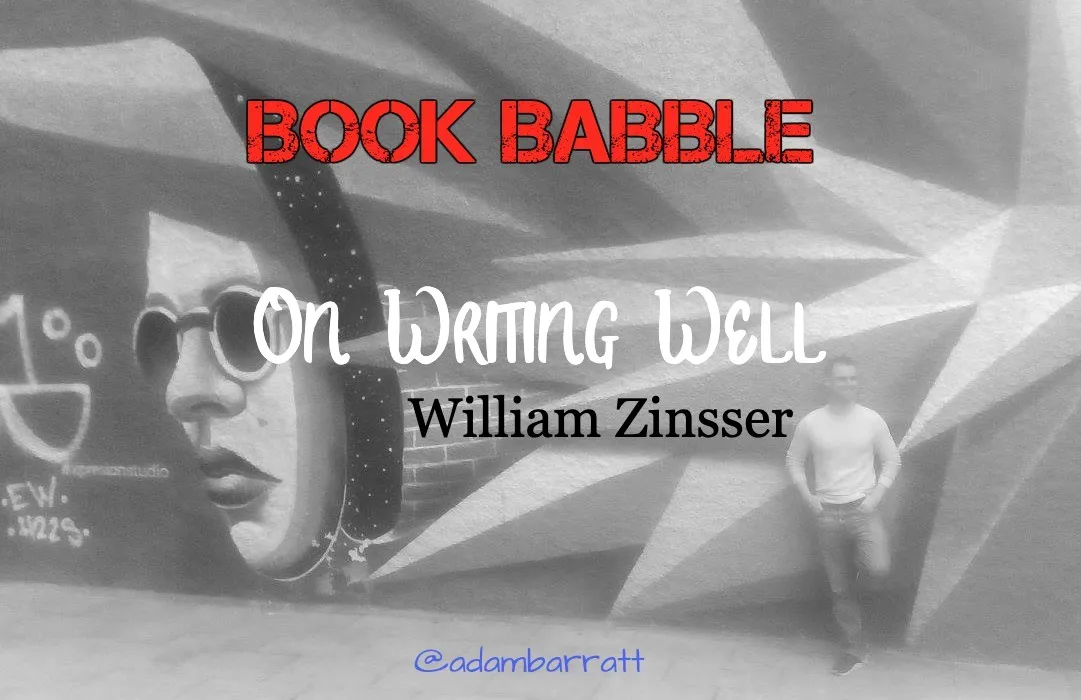
Here we have a great book I read a number of years ago, as the title may suggest, on writing well! Being a writer and seeing it recommended I thought it good to check out as one of the first few books I ever got on Kindle.
Not to be confused with Stephen King's non-fiction classic On Writing, although it does of course relate and can complement that well. Either way, worth checking out both whether you identify as a writer, want to improve, or are just interested in the subject.
In this offering Zinsser gives his guide of practical advice and timeless wisdom. There are a few sections of the book which I'll quickly summarise, pick out a few quotes, and wrap up at the end…
So what's the gist?
1. The Principles
Zinsser emphasises clarity, simplicity, and brevity. Writers should strip their prose of unnecessary words and clutter, and aim for directness/precision. He also advocates for writing with a natural voice and being authentic, avoiding jargon or complicated language that can make it unclear.
2. The Methods
Here we have specific techniques for the nuts and bolts of improving writing. The author stresses the importance of rewriting and revision, as good writing comes from the editing process. He also suggests writing in the first person, when appropriate, to create a personal connection with the reader and the importance of rhythm, pacing, and structure.
3. The Forms
What can you write? Well, there's non-fiction writing (including memoirs), travel and sports writing. There's advice tailored to each genre, such as the importance of capturing details and sensory experiences in travel writing or the need for a strong narrative in memoirs. You're encouraged to find your own voice and uncover your unique perspective, whichever route you take.
4. The Attitude
In the final section, Zinsser addresses the writer's mindset. Obviously important in any undertaking and this is no exception. We cover the importance of confidence and enthusiasm in writing and the value of taking risks, along with being willing to experiment with different styles and approaches. Ultimately we need to find joy in the process and to write with passion and purpose.
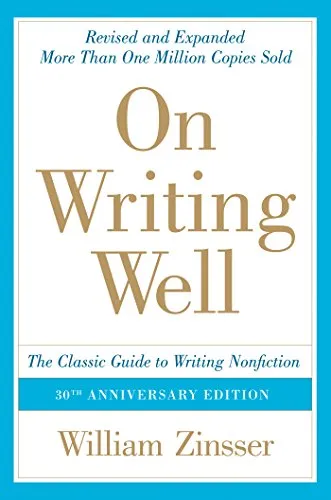
Top Takes: some great quotes from the book followed by my thoughts…
For there isn’t any “right” way to do such personal work. There are all kinds of writers and all kinds of methods, and any method that helps you to say what you want to say is the right method for you.
There's no right or wrong per se, just your own way. Yes, there are stylistic things that may fit or work well, but just like each personality out there in the world, the same applies when it is transferred to the page. What means something to you will be different to others and others with a similar view will flock to your work.
Ultimately the product that any writer has to sell is not the subject being written about, but who he or she is.
That's where it stems from, as it's a person writing it after all. They are the 'product' and the centre of it all, where all the creativity stems from and will infuse all that is written.
But the secret of good writing is to strip every sentence to its cleanest components.
The bare essentials, and getting the point across… not writing for the sake of writing or trying to look clever or cool etc.
Clear thinking becomes clear writing; one can’t exist without the other.
They work hand-in-hand and affect the other. Clarity of thought transfers to the page and a scattered mind is going to show in your writings and in life in general.
Writers must therefore constantly ask: what am I trying to say? Surprisingly often they don’t know.
We're often just rambling for the sake of it. Here we're looking at a specific purpose and pursuing it in the most clear way. Whenever in doubt, we can stop and ask ourselves what we're trying to achieve and refine our efforts,
Readers want the person who is talking to them to sound genuine. Therefore a fundamental rule is: be yourself.
You hear a lot about 'authenticity' out there. Yes, it's great to be so, but some people over-use it and try to convince us they are that way. However, it tends to speak for itself. Honesty, being genuine and true to yourself shines through… those who like it will (might) jump on board, the rest will steer clear (which is fine, everyone can find their 'tribe').
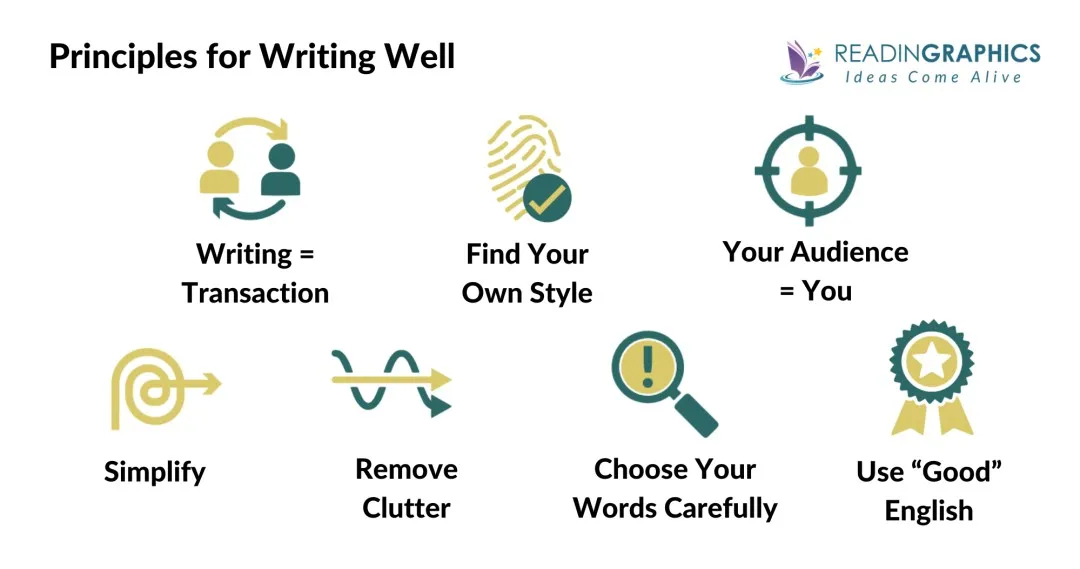
They must relax, and they must have confidence / Good writing is lean and confident
2 quotes here, but covering the same principle. Confidence is just so important, as well as being in a relaxed state. Stripping things down to the point and delivering with confidence and ease is where it's at.
Sell yourself, and your subject will exert its own appeal. Believe in your own identity and your own opinions. Writing is an act of ego, and you might as well admit it. Use its energy to keep yourself going.
It is all about you to a degree. Yes, you're writing for an audience and they're important, but it is you who are the writer and the one delivering the message, whatever that may be.
Never say anything in writing that you wouldn’t comfortably say in conversation. If you’re not a person who says “indeed” or “moreover,” or who calls someone an individual (“he’s a fine individual”), please don’t write it.
Write naturally, and in a friendly conversational tone. Of course, this can vary on the situation but the majority of the time it's the best way to go, as it will come across better for the reader anyway. Unless you're writing in a different 'voice' for a reason, then stick to your own style as that is what you're 'selling'.
Therefore ask yourself some basic questions before you start. For example: “In what capacity am I going to address the reader?” (Reporter? Provider of information? Average man or woman?) “What pronoun and tense am I going to use?” “What style?” (Impersonal reportorial? Personal but formal? Personal and casual?) “What attitude am I going to take toward the material?” (Involved? Detached? Judgmental? Ironic? Amused?) “How much do I want to cover?” “What one point do I want to make?”
Some great advice on narrowing down your target and speaking to them in the right way.
Memoir isn’t the summary of a life; it’s a window into a life
Memoirs aren't necessarily an auto-biography of life, but rather a detailed snapshot of a section of life. Dive deep into a certain area or period of your own or someone else's life rather than trying to squeeze it all in and just skimming.
“I always thought that there was at least one person in the stands who had never seen me play, and I didn’t want to let him down.”
You're always going to be 'new' to someone and you want them to see the best of you as they won't have any other context. Always operate that way and give your best (as much as that is possible) and constantly leave great impressions.
Video review by Productivity Game on YouTube
Thanks William! Anything Else?
So how can we sum it up and apply it to our written world? Here are a few key pointers…
- Clarity and Simplicity: Write clearly and concisely, avoiding unnecessary complexity.
- Revision: Good writing is the result of rigorous editing and rewriting.
- Voice: Develop an authentic voice that resonates with readers.
- Specificity: Use specific details and examples to bring your writing to life.
- Confidence: Write with confidence and enthusiasm… and embrace the challenges of the craft!
Not just a manual for writing well but also a celebration of the craft of writing in general, which encourages writers to find their voice and write with passion whilst constantly striving to improve their work.
And as mentioned at the start, be sure to check out On Writing by Stephen King. There may well be some cross-over there as well as different ideas… and that chap has done alright.
There are plenty of tips for us all and most of us will get something out of a book like this. Enjoy!
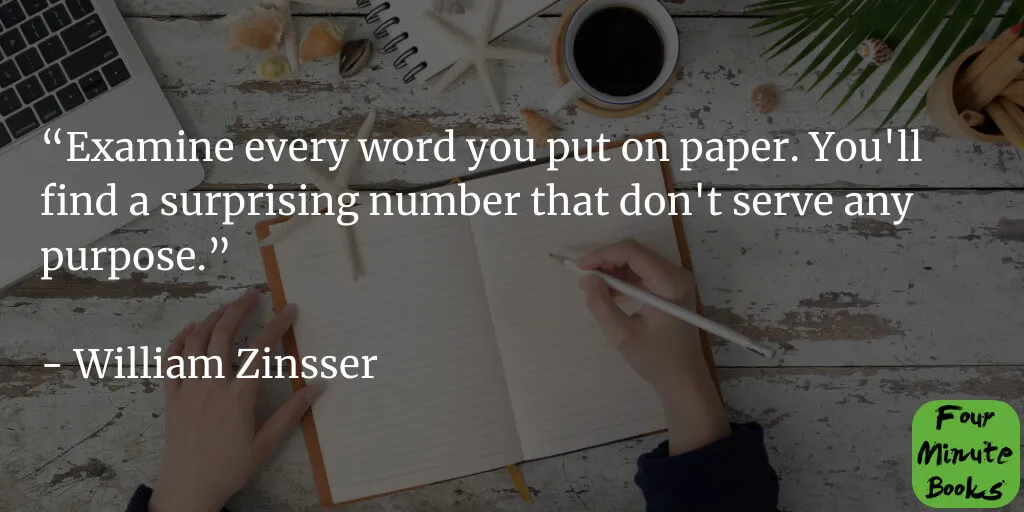
First image my own, other images and video linked to source
- 1-50: First 50 BookBabbles
- 51: THE DAILY STOIC - Ryan Holiday
- 52: MAKE TIME - Jake Knapp & John Zeratsky
- 53: GRIT - Angela Duckworth
- 54: WHAT I TALK ABOUT WHEN I TALK ABOUT RUNNING - Haruki Murakami
- 55: THE PURSUIT OF PERFECT - Tal Ben-Shahar
- 56: THE SLIGHT EDGE - Jeff Olson
- 57: CONTAGIOUS - Jonah Berger
- 58: THE RICHEST MAN IN BABYLON - George S. Clason
- 59: THE 5 AM CLUB - Robin Sharma
- 60: THINK LIKE DA VINCI - Michael Gelb
- 61: INFLUENCE - Robert Cialdini
- 62: THE ONE THING - Gary Keller
- 63: THE 12 WEEK YEAR - Brian Moran & Michael Lennington
- 64: THE POWER OF YOUR SUBCONSCIOUS MIND - Joseph Murphy
- 65: THE UNTETHERED SOUL - Michael A. Singer
